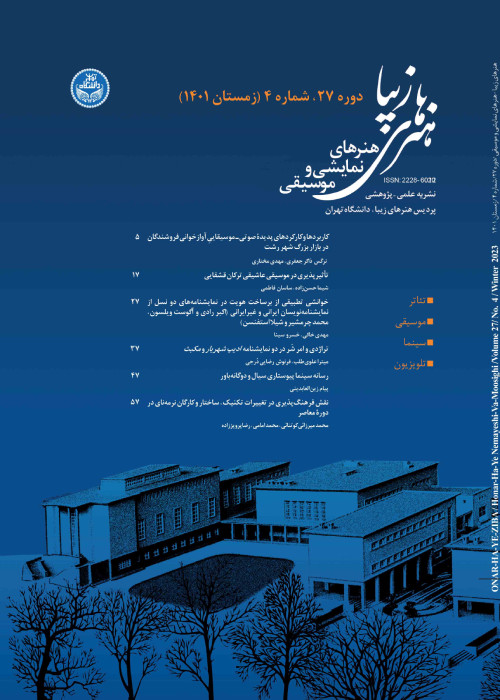Realism in Film: A Critical Survey on Gregory Currie's Theory of Likeness
Author(s):
Abstract:
Cinema has traditionally been described as the most realistic art. Nonetheless، the concept of reality in film، as in any other art form، has been defined in various ways. The foremost and most prominent aesthetic and even cognitive question in film studies has been the question of reality and its relation to film. Philosophers of film، from the first ones such as Hugo Munsterberg to the most recent ones such as the cognivist Gregory Currie، have thought about film in terms of either realism or illusionism. Currie''s ideas on film are amongst the most recent theories concerning film and reality in film. As a philosopher، Currie has made room for film in his philosophy، and has attempted، through the use of cognitive science، to solve some of the theoretical problems of film theory. In Currie''s view، the relation between film and reality has been considered from three different standpoints: 1) Transparency، which claims that films، through the use of a photographic method، not only represents the reality but also reproduces it. This view is mostly known by the work of French film theorist Andre Bazin. 2) Likeness، which is based on the idea that watching films is almost similar to observing the real world. This view is also attributed to Andre Bazin، in his emphasis on the long take and deep focus filmmaking. 3) Illusionism، which claims that film is capable of producing for the spectator an illusion of reality. Most film theorist hold this position regarding the relation between film and reality it depicts on the screen. In his seminal work Image and Mind: Film، Philosophy، and Cognitive Science، Gregory Currie firstly discusses these three standpoints، then rejects both Transparency and Illusionism، and accepts Likeness. He defends the idea of Likeness by arguing that watching films generates a kind of experience which is similar to the normal experience generated in us while perceiving the world. This article firstly tries to introduce briefly the threefold relations among film، reality، and illusion. Secondly، it tries to elaborate on the concept of «likeness» in Currie''s theory. Currie has criticized the two other concepts – transparency and illusionism – which have been put forward by other film theorists regarding the problem of reality in film. Currie himself favours the concept of «likeness» as best explanation for film realism. This article tries to demonstrate some of the shortcomings of Currie''s concept of Likeness، arguing that his theory also fails to answer some of the most important questions regarding the issue of film realism. The article concludes that in the recent years there have been many new technological developments in film production and film reception that have changed the traditional concept of Film. The article argues that due to these radical changes in the concept of «film»، as well as recent technological advances in film production and projection، theories of film realism also need a radical transformation. Such transformations seem necessary if film theories are still in search of new answers to the new questions about film.
Keywords:
Language:
Persian
Published:
Honar-Ha-Ye-Ziba: Honar-Ha-Ye Mosighi Va Namayeshi, Volume:18 Issue: 48, 2013
Pages:
21 to 30
magiran.com/p1250098
دانلود و مطالعه متن این مقاله با یکی از روشهای زیر امکان پذیر است:
اشتراک شخصی
با عضویت و پرداخت آنلاین حق اشتراک یکساله به مبلغ 1,390,000ريال میتوانید 70 عنوان مطلب دانلود کنید!
اشتراک سازمانی
به کتابخانه دانشگاه یا محل کار خود پیشنهاد کنید تا اشتراک سازمانی این پایگاه را برای دسترسی نامحدود همه کاربران به متن مطالب تهیه نمایند!
توجه!
- حق عضویت دریافتی صرف حمایت از نشریات عضو و نگهداری، تکمیل و توسعه مگیران میشود.
- پرداخت حق اشتراک و دانلود مقالات اجازه بازنشر آن در سایر رسانههای چاپی و دیجیتال را به کاربر نمیدهد.
دسترسی سراسری کاربران دانشگاه پیام نور!
اعضای هیئت علمی و دانشجویان دانشگاه پیام نور در سراسر کشور، در صورت ثبت نام با ایمیل دانشگاهی، تا پایان فروردین ماه 1403 به مقالات سایت دسترسی خواهند داشت!
In order to view content subscription is required
Personal subscription
Subscribe magiran.com for 70 € euros via PayPal and download 70 articles during a year.
Organization subscription
Please contact us to subscribe your university or library for unlimited access!


